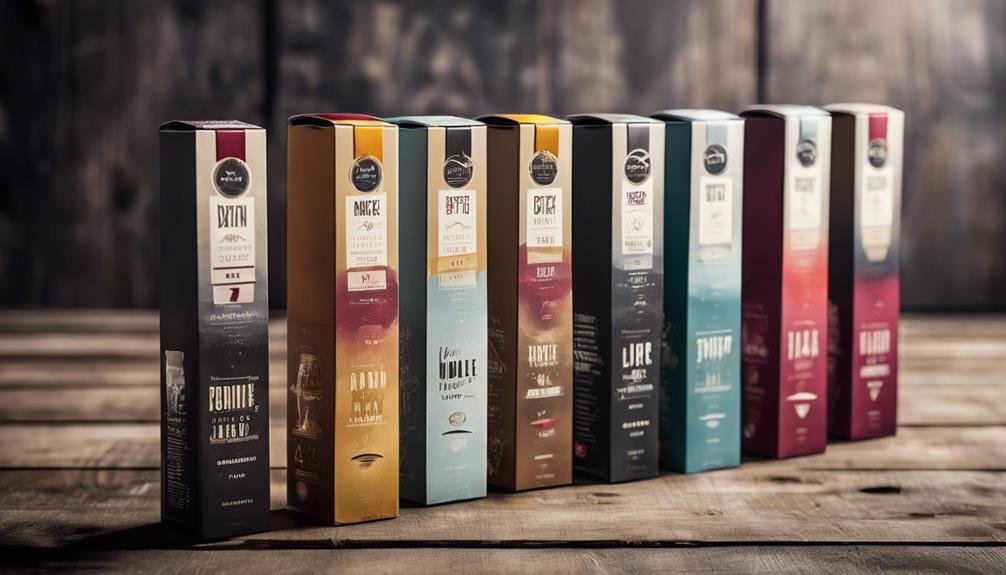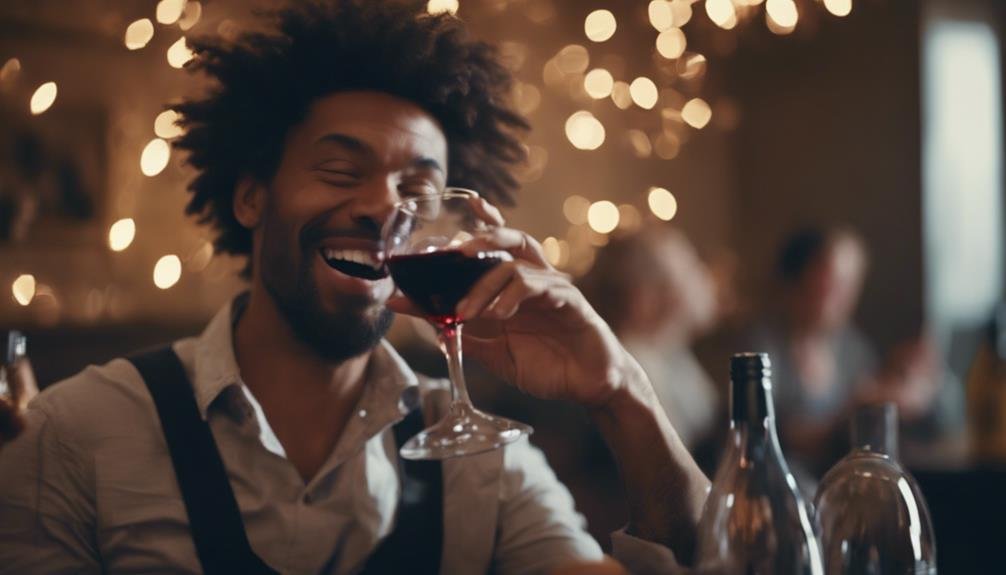The boxed wine revolution has revolutionized the wine industry, offering quality, value, and convenience. Innovations in packaging now provide premium wines under $20 in durable, eco-friendly containers. These boxed wines maintain freshness for 6-8 weeks after opening, meeting demands for both taste and practicality. Producers like Black Box, Climber Wines, and Bandit are challenging traditional perceptions, with award-winning offerings. Notable for their longevity, boxed wines can age for 6-8 months for whites and 10-13 months for reds. Scientifically debunked misconceptions about plastic taste reveal the benefits of durable and cost-effective packaging. Embracing this trend uncovers a world of modern wine experiences.
Evolution of Boxed Wine
How has the evolution of boxed wine transformed its reputation from a low-quality product to a viable option for quality and value-seeking consumers?
The innovation trends in boxed wine have led to a significant shift in consumer preferences. Initially plagued by quality issues due to technological limitations, boxed wine has now emerged as a competitive choice for those seeking both quality and affordability.
With premium wines now available in boxed formats for under $20, consumers are recognizing the value proposition offered. The extended shelf life of opened boxed wine, lasting 6-8 weeks compared to just 5 days for opened bottled wine, further enhances its appeal.
These advancements showcase how boxed wine has evolved to meet the demands of discerning consumers, aligning with their desire for quality and convenience.
Durability and Cleanliness Benefits
Boxed wine's durability and cleanliness advantages stem from its composition of sturdy food-grade plastic, offering a reliable and hygienic storage solution for wine enthusiasts. The sturdy construction of boxed wine containers guarantees that they can withstand transportation and storage without the risk of breakage or spoilage. This durable packaging also eliminates the potential for wine faults like cork taint, commonly found in bottled wines.
The use of food-grade plastic in boxed wine packaging not only enhances durability but also maintains cleanliness by preventing contamination. Similar to how most refrigerated foods are stored in plastic, boxed wine provides a secure and sanitary environment for wine, making it a practical choice for consumers seeking convenience and quality in their wine storage options.
Notable Boxed Wine Producers

Among the notable producers in the boxed wine market are Climber Wines, Bandit, and Black Box, recognized for their innovative approaches and quality offerings.
Climber Wines stands out with its innovative packaging, offering a convenient pouch ideal for outdoor activities like hiking.
Bandit is known for its eco-friendly wines presented in color-coordinated cartons, appealing to environmentally conscious consumers.
Black Box has garnered acclaim with 28 gold medals for their award-winning wines, showcasing their commitment to quality and excellence.
These producers have successfully combined innovative packaging with exceptional winemaking to provide consumers with a diverse range of high-quality boxed wines that challenge traditional perceptions of wine packaging.
Ageability and Market Insights
Notable boxed wine producers have demonstrated a strong focus on quality and innovation, reflecting an intriguing interplay between ageability and market dynamics within the boxed wine industry. Long term storage capabilities of boxed wine have been a topic of interest, with unopened boxes lasting 6-8 months for whites and 10-13 months for reds. This feature aligns well with consumer trends favoring convenience and sustainability, making boxed wine an attractive option for those looking to stock up on quality wine without the immediate pressure to consume. The market size for boxed wine continues to grow, with significant players like Franzia selling millions of gallons annually, showcasing a shift in consumer preferences towards more affordable and eco-friendly options.
| Long Term Storage | Consumer Trends | Market Size |
|---|---|---|
| 6-8 months for whites | Favoring convenience | Franzia sold 58 million gallons in 2007 |
| 10-13 months for reds | Sustainability focus | Growing market segment |
Plastic Taste Debunked

The misconception surrounding the influence of polyethylene on wine flavor in boxed wine has been effectively dispelled through empirical studies and industry expertise. Despite initial concerns, plastic taste in boxed wine is a non-issue due to the following key reasons:
- Scientific studies confirm polyethylene does not alter wine taste.
- Misconceptions often stem from preconceived biases.
- Material benefits of plastic packaging include durability and cost-effectiveness.
- Environmental impact is reduced with less material waste compared to traditional bottles.
- Industry experts recognize the advantages of using plastic in boxed wine production.
Frequently Asked Questions
Can Boxed Wine Be Stored Sideways Like Bottled Wine?
Boxed wine should be stored upright to prevent oxidation and maintain shelf stability. Unlike bottled wine, boxed wine relies on a spout for dispensing, so horizontal storage isn't necessary. Tasting notes may vary due to prolonged exposure to air.
Are There Any Health Risks Associated With Boxed Wine Packaging?
Boxed wine packaging poses minimal health risks, with its food-grade plastic being safe for consumption. The environmental impact is favorable, as it reduces material waste compared to bottled wine. Convenience and freshness are enhanced with extended storage capabilities.
How Do You Properly Recycle Boxed Wine Containers?
Recycling boxed wine containers is beneficial for the environment. To properly recycle them, make sure they are clean and dry. Look for recycling symbols on the packaging or consult local guidelines. Choosing eco-friendly alternatives supports sustainability efforts.
Can Boxed Wine Be Used for Cooking and Marinating Like Bottled Wine?
Boxed wine can be utilized for cooking applications and marinating, serving as a convenient and cost-effective option. Its flavor enhancement capabilities are comparable to bottled wine, making it a versatile choice in culinary endeavors.
Are There Any Specialized Accessories Needed to Serve Boxed Wine?
To serve boxed wine effectively, specialized accessories like wine aerators and decanter spouts are not necessary. Boxed wine's packaging design allows for convenient pouring directly from the spout, eliminating the need for additional tools, making it a user-friendly option.
Conclusion
To sum up, the boxed wine revolution offers consumers a convenient and eco-friendly alternative to traditional bottled wines. With improved quality, extended shelf life, and affordable pricing, boxed wine has become a popular choice for wine enthusiasts.
As the market continues to grow, the future of boxed wine looks promising, providing a rejuvenating and innovative way to enjoy this timeless beverage. Like a bouquet of flavors waiting to be uncorked, boxed wine offers a tantalizing experience for all to savor.